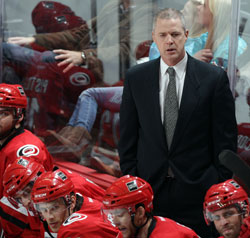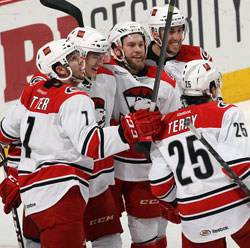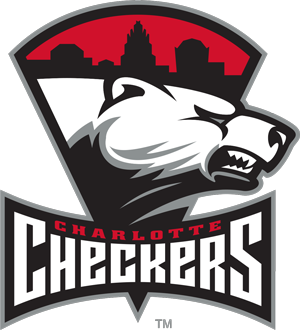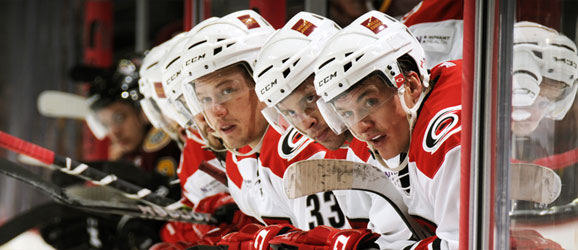Their game against Texas this Saturday, the middle of a three-in-three set at Time Warner Cable Arena, will mark the official halfway point of their season – game 38 of 76. They enter that series with some momentum, having won each of their last three games to put them one away from getting back to the .500 mark for the first time since Nov. 7.
“From just before Christmas on, we’ve played a lot of good hockey and we’ve been in every game,” said coach Jeff Daniels. “We’re scoring more goals as a committee, we’re getting better defensively and guys are stepping up when others get called up or injured.
“We just want to get better every day and I think we’re doing that. We’re a better team now than we were a month ago, and we’ve just got to keep going in the right direction.”

In order to get to exactly 88 points, the average amount it has taken to make the playoffs in the Western Conference over the last two seasons, they would need a record of 24-11-5 from this point forward. As a reference, that is nearly identical to last season’s first half that gave the Checkers ample breathing room when the end of the NHL lockout dramatically altered their roster and injuries began to come in waves. Through 38 games last season, the team was 22-11-5, giving it the best record in the West.
The task ahead sounds daunting, but it's essentially getting two wins for every loss, which should come as no surprise.
“We know we dug ourselves a hole by losing seven straight and we’re still trying to climb out of it, but I think there’s a bunch of teams all clumped together and we’re in that clump now,” said Daniels of the current standings, which feature seven teams separated by nine points in spots five through 13. “We’ve just got to keep moving forward. We realize where we’re at and that we have to win games.”
“It’s time to buckle down because playoffs are just around the corner,” said defenseman Mark Flood. “You’re going to start hearing that word more and more. It’s our goal to get to the playoffs and hopefully make a run.”
As much as the historic losing streak set them back, there is hope that those growing pains could be what allow the team to make a leap forward. In many of the Checkers’ earlier losses, they had been tied in the third period but fell behind every time. As of Wednesday, nine of their last 10 victories had come by one goal, with the Checkers scoring the game-winner in the third period or overtime in seven of those games.
“You learn from that,” said Daniels of the team’s November struggle. “It’s about being consistent and pushing for that full 60 minutes. It’s very seldom, if at all, that you ever get there, but that’s got to be your goal. Be hard to play against for 60 minutes, play your structured game for 60 minutes and never stop the fight. Never stop battling.”
“I feel like as a team we’ve gotten a lot stronger and have gotten over that bump where we weren’t a very confident group,” said center Brody Sutter. “For whatever reason in November we just couldn’t catch a bounce, and now it’s the other teams making bad reads at the end of the game that cost them instead of us doing it. We kind of figured that if we kept playing hard it would kind of turn our way, and I feel like it has.”

“That was a big confidence booster for the guys and the most excited I’ve seen the bench in a long time,” said Sutter. “Guys were jumping all over each other. That was a really intense, physical week and we ended up getting all four points against a really good team.”
That, and other big wins earned around that time, has had a long-term effect.
“When we were on that slide, our team confidence wasn’t good and the morale of our team wasn’t good,” said Flood. “Guys are enjoying coming to the rink more these days. We’re meshing as a group, we’re excited, we have enthusiasm and passion in our games, and that’s helped us.”
“Losing seven in a row was tough on us, but we’re bouncing back and playing well as a team,” said defenseman Matt Corrente. “We’ve got a good group of guys that are getting along really well. There’s a lot of good team chemistry and everyone is excited to come to the rink. We all want to make the playoffs and know that we deserve to be there.”
Aside from the mental aspects of the game, players returning from the NHL (Zach Boychuk, Aaron Palushaj, Brett Sutter and Chris Terry are all with Charlotte, at least for now) and those acquired via trade (Philippe Cornet and Greg Nemisz) give the team a strong forward group, though the injured Nicolas Blanchard, Sean Dolan and Jared Staal are certainly missed. A.J. Jenks and Matthew Pistilli, effective since rejoining the team on tryout contracts, further strengthen that group. Danny Biega and Rasmus Rissanen returning from injury has recreated depth on defense, while a resurgent duo of John Muse and Mike Murphy appear to be forming a solid tandem in goal.
Even though all of that has put his team on solid footing to begin the second half, Daniels has stressed the importance of consistency and taking each game as it comes. After all, overreacting to success could prove just as dangerous as overreacting to adversity was two months ago.
It’s a different situation for the Checkers, who never sat lower than third place in their conference at the halfway point of their first three AHL seasons. A comeback would be a first, but if they’re now capable of doing on a smaller scale in individual games, why not over a longer period of time?
“We’ve still got some work to do, but as a team we’ve been playing together and we’ve improved parts of our game that needed improving,” said Flood. “We’ve still got a ways to go, but we’re getting a couple of wins together, which is the most important thing.”
“Every night we come to the rink and believe we can win now, which is what you’ve got to believe,” said Sutter.






